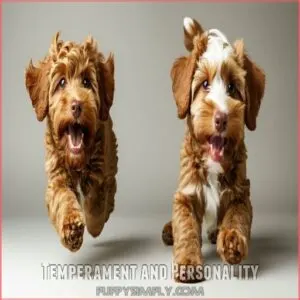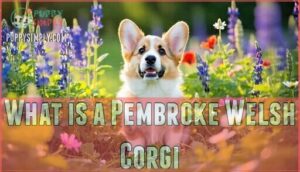This site is supported by our readers. We may earn a commission, at no cost to you, if you purchase through links.

These smart, short-legged pups aren’t just famous for their adorable looks but also their rich history linked with royalty and folklore.
Imagine a dog that fits perfectly into your life, whether you’re in a bustling city apartment or a sprawling countryside estate.
With their sharp intelligence and need for daily exercise, they keep you on your toes, ensuring every day is filled with joy.
If you’re curious about discovering a world of delightful quirks and joys with a Pembroke Welsh Corgi, read on!
Table Of Contents
- Key Takeaways
- Pembroke Welsh Corgi Overview
- What is a Pembroke Welsh Corgi
- Origins and History
- Pembroke Welsh Corgi Care and Exercise
- Training a Pembroke Welsh Corgi
- Pembroke Welsh Corgi Health Considerations
- Pembroke Welsh Corgi Lifestyle and Living
- Pembroke Welsh Corgi Facts and Trivia
- Finding a Pembroke Welsh Corgi
- Frequently Asked Questions (FAQs)
- What is the difference between a Corgi and a Pembroke Welsh Corgi?
- Are Corgis high maintenance?
- What are the pros and cons of a Pembroke Welsh Corgi?
- Can Corgis be left alone?
- How do Pembroke Welsh Corgis interact with cats?
- What are signs of Pembroke Welsh Corgi anxiety?
- How to minimize Pembroke Welsh Corgi shedding?
- What toys are best for Pembroke Welsh Corgis?
- How are Pembroke Welsh Corgis with apartment living?
- Conclusion
Key Takeaways
- You’ll find Pembroke Welsh Corgis to be intelligent and friendly companions that are perfect for families, with their playful nature and loyalty.
- Understand Corgis’ exercise needs as they require at least an hour of daily activity to maintain their health and manage their lively temperament.
- Watch out for Corgis’ common health issues like hip dysplasia and eye problems; selecting a reputable breeder and ensuring regular vet visits can help mitigate these concerns.
- Corgis adapt well to different living spaces, including apartments, but their social nature means they thrive on companionship and engagement.
Pembroke Welsh Corgi Overview
The Pembroke Welsh Corgi, with its short legs and long body, is unmistakably charming and bred for herding.
You’re sure to find them intelligent, friendly, and full of character, making them beloved companions.
Physical Characteristics
How do Pembroke Welsh Corgis look so charming and unique?
It starts with their compact size—standing about 10 to 12 inches tall, they weigh between 24 to 30 pounds.
These sturdy little dogs have short legs and long bodies, perfect for herding, while their fox-like faces add a dash of mischief.
Their ears stand erect, ready to catch every sound, and their tails are often docked short.
With a medium-length double-layered coat, they sport colors like red, sable, and fawn, sometimes with striking white markings.
That confident stance and wagging tail embody their spirited nature and love for family adventure.
Temperament and Personality
Those adorable short legs and fluffy butt? That’s just the beginning!
Pembroke Welsh Corgis are known for their friendliness and loyalty, making them fantastic family companions.
Their intelligence shines through, but you’ll also discover some Corgi quirks—a bit of stubbornness and a strong herding instinct. This means training can be fun but requires patience.
Early socialization helps them become well-adjusted, lessening potential training challenges.
Remember, these dogs are social creatures; they thrive on interaction and attention. Their playfulness is infectious, ensuring plenty of laughs.
Expect a devoted friend with a unique blend of charm and spunk. It’s what makes them so special.
What is a Pembroke Welsh Corgi
A Pembroke Welsh Corgi is a lively bundle of joy that brings endless smiles to your home.
As a herding dog, this breed is known for its intelligence and love for playful antics, and like other small dog breeds with big personalities, they require early socialization and training to become confident companions.
Here’s what you’ll love about them:
- Corgi Personality: Friendly, outgoing, and full of energy.
- Corgi Lifespan: Generally 12-15 years with proper care.
- Corgi Care Tips: They thrive with daily exercise and mental stimulation.
With their adorable fox-like faces and affectionate nature, Corgis quickly become family favorites.
Origins and History
You might be surprised to learn that Pembroke Welsh Corgis have a rich history intertwined with both folklore and noble roots.
Thought to be gifts from fairies and possibly descended from Viking dogs, these charming companions were officially recognized in the 1930s, winning royal hearts and homes alike.
Welsh Folklore and Origins
Pembroke Welsh Corgis, wrapped in Welsh mythology, were said to be gifts from fairies—yes, the magical kind.
In folklore, these stout companions pulled fairy carriages through mystical lands.
Fairies even marked them with saddle-shaped patches on their fur.
| Folklore Element | Description |
|---|---|
| Fairy Legend | Fairy gifts |
| Mythical Mark | Saddle patches |
| Role in Legend | Carriage pullers |
These tales lend Corgis an enchanting legacy, weaving charm into their breed history.
Viking and Flemish Influences
Through Viking trade routes, the Pembroke Welsh Corgi might trace its roots to Swedish Vallhunds.
Imagine these little companions journeying from Viking lands, merging with local breeds in Wales.
Meanwhile, Flemish weavers, known for their intricate textiles, also brought their own dogs when settling in the 12th century.
This cultural exchange likely influenced the genetic similarities we see today, painting a fascinating picture of historical records and Welsh folklore combined.
Official Recognition
You’ll be pleased to know that the UK Kennel Club officially recognized the Pembroke Welsh Corgi breed in the 1930s, sharpening its distinct status alongside the Cardigan Corgi. Like the Beagles, who were bred for hunting, the Pembroke Welsh Corgi’s history and origins are steeped in tradition, with their working dog traits still celebrated today. Hunting and tracking skills similar to these are highly valued in working dogs.
This breed’s popularity rocketed, partly thanks to Queen Elizabeth II’s fondness.
Here’s how things unfolded:
- Breed Recognition: Distinguished from the Cardigan Corgi.
- Kennel Club History: Acknowledged by the UK Kennel Club.
- International Recognition: Fame grew with royal ties.
Pembroke Welsh Corgi Care and Exercise
Caring for your Pembroke Welsh Corgi means focusing on regular exercise and a balanced diet to keep them healthy.
A bit of daily grooming helps manage shedding and keeps their coat looking its best.
Daily Exercise Needs
So, you’ve learned about their fascinating history. Now, let’s talk about keeping your Corgi happy and healthy.
These energetic dogs need a good workout daily. Think at least an hour!
| Day | Morning | Afternoon | Evening |
|---|---|---|---|
| Monday | 30-minute brisk walk | 20 minutes of fetch | 10 minutes of playtime |
| Tuesday | 20-minute jog | 15 minutes of agility training | 25 minutes of sniffing walk |
| Wednesday | 30-minute hike | 20 minutes tug-of-war | 10 minutes of chasing games |
| Thursday | 20-minute walk with friends | 15 minutes of hide-and-seek | 25 minutes of calm play |
Remember, a tired Corgi is a happy Corgi!
Avoid overexertion, especially in hot weather. Always provide fresh water.
Diet and Nutrition
Pembroke Welsh Corgis, like many dogs, thrive when you pay close attention to their diet and nutrition. Here are four tips for keeping your Corgi healthy:
- Weight Management: They’re prone to weight gain, so balance is key.
- Food Sensitivities: Keep an eye out for any reactions to certain ingredients.
- Homemade Recipes: These can be healthier alternatives.
- Commercial Dog Food Brands: Opt for high-quality brands for the best nutrition.
Grooming and Shedding
Caring for your Pembroke Welsh Corgi involves keeping that adorable corgi coat looking its best.
Regular brushing, ideally a few times a week, helps manage shedding and keeps their fur tangle-free.
A soft-bristled brush or a grooming mitt works wonders.
Baths should be occasional to avoid stripping their natural oils.
Embrace shedding season with patience and keep that vacuum handy—your corgi will look fabulous with a little consistent effort!
Training a Pembroke Welsh Corgi
Training your Pembroke Welsh Corgi is a rewarding experience, as their intelligence makes them keen to learn new tricks.
Positive reinforcement and consistent socialization can help manage their tendency to be vocal and ensure they’re well-adjusted companions.
Intelligence and Trainability
Training your Pembroke Welsh Corgi can feel like a wild ride due to their intelligence and stubborn streak.
Regular grooming, including pre-bath brushing for thick coats, is essential for maintaining the Pembroke Welsh Corgi’s coat. These herding dogs quickly master common commands and dog tricks.
Use positive reinforcement to tap into their natural problem-solving skills, ensuring mental stimulation.
While Corgis are highly trainable, persistence is key.
Keep sessions fun and consistent, blending obedience with play to harness their full potential.
Socialization and Barking
Tackling the noise challenges with your Corgi involves early socialization and understanding barking triggers. These pups can be vocal when sensitive to sounds, which can drive you up the wall.
So, include puppy training focused on:
- Noise sensitivity: Gradually introduce different sounds.
- Sound desensitization: Reward calm behavior around common noises.
- Socialization: Expose to various environments and people, helping them feel secure.
Positive Reinforcement Techniques
After working on minimizing excessive barking with early socialization, use positive reinforcement to train your Pembroke Welsh Corgi.
Picture treat-based training like a pot of gold at the end of a rainbow—clicker training and a solid reward system can work wonders.
Praise and reward guide them toward desired dog behavior, ensuring consistent training.
This method fosters obedience, making your corgi enthusiastic to learn and bond.
Pembroke Welsh Corgi Health Considerations
You’ll want to be aware of some health concerns common to the breed, like hip dysplasia. Let’s discuss these potential issues so you can best care for your Corgi.
Common Genetic Health Issues
Ever wondered why understanding Pembroke Welsh Corgis’ health is important?
These lovable companions often deal with genetic issues like eye problems, degenerative myelopathy, and Von Willebrand disease.
Early detection and preventative care can save you from the hefty cost of treatment.
Responsible breeding practices, including genetic testing, are your best bet for a healthy pup.
Always choose breeders who prioritize health over aesthetics to make sure your Corgi thrives.
Hip Dysplasia and Joint Problems
Hip dysplasia and joint problems can be a real concern for your Pembroke Welsh Corgi, but you’re not alone in this journey.
Early detection is key to ensuring your pup stays healthy and happy.
Here are a few simple tips:
- Monitor your corgi’s walking patterns regularly.
- Limit strenuous exercise to prevent stress on joints.
- Consult your vet for treatment options and long-term care to keep those adorable legs in top shape.
Eye Problems and Degenerative Myelopathy
Spotting eye issues and degenerative myelopathy early in your Pembroke Welsh Corgi gives them a fighting chance.
Genetic testing and being aware of common issues, such as those affecting teacup puppies lifespan, can help identify potential health risks early. Genetic testing and preventative care can help manage these health issues.
You can also look into supplements specifically formulated for Corgis to support their overall health and well-being.
Treatment options vary, but embracing life with degenerative myelopathy involves adjustments. Think of it as a dance where you learn new steps together with your Corgi.
Here’s a quick overview:
| Health Issue | Detection |
|---|---|
| Eye Problems | Early |
| Genetic Testing | Yes |
| Preventative Care | Essential |
| Treatment Options | Range |
| Living with Myelopathy | Adaptable |
Pembroke Welsh Corgi Lifestyle and Living
When you welcome a Pembroke Welsh Corgi into your home, expect an affectionate companion that’s great with families and kids.
They’re adaptable to various climates.
Socialization is needed to get along with other pets.
Family Suitability and Child-Friendliness
For family dogs, Pembroke Welsh Corgis are a solid match.
Their affectionate nature makes them perfect companions for children, fostering delightful Corgi-kid bonding.
Although they’re friendly and playful, supervision tips are essential for ensuring play safety.
Training kids to respect these little companions enhances everyone’s experience, blending fun and safety.
Remember, their temperament matches best with gentle interactions, making them truly kid-friendly pets in a bustling household.
Compatibility With Other Pets
Welcoming a Pembroke Welsh Corgi into a home with other pets can be a delightful adventure.
They’re generally family-friendly but need proper socialization to thrive in multi-pet households.
To make sure harmony:
- Introduce pets gradually: Slow and supervised meetings help.
- Mind cat compatibility: Corgis can coexist well with felines if raised together.
- Watch for dog aggression: Early training curbs any canine friction, making them perfect companions.
Adaptability to Different Climates
So, you’ve got a new furry friend, and you’re wondering about climate? Pembroke Welsh Corgis aren’t built for extreme heat; think of them as "cool-climate" dogs. Their double coat helps with cold tolerance, but summer heat can be tough.
Unlike breeds like Great Danes, who are highly sensitive to cold and require precautions like monitoring outdoor temperatures, Pembroke Welsh Corgis generally adapt well to moderate temperatures.
Regular exercise is still key, but adjust timing to avoid midday sun. Their grooming needs don’t change with the seasons, but you might notice shedding increases a bit in spring. Overall, these adaptable pups do best in moderate climates. They’re pretty low-maintenance.
Pembroke Welsh Corgi Facts and Trivia
You might find it intriguing that Pembroke Welsh Corgis are often linked to fairies in Welsh folklore, supposedly aiding them in transportation.
Their royal connections with Queen Elizabeth II have greatly boosted their popularity over the years.
Unusual Origins and Folklore
Fairy-drawn carriages and myths color the history of the Pembroke Welsh Corgi.
According to Welsh legends, these energetic dogs once served fairies, pulling their carriages at night.
Picture a world where Corgis were more than pets—they were mystical beings.
Apart from folklore, Viking influence and Flemish weavers possibly introduced them to Wales, blending mythical origins with a dog’s rich history, alongside their cousins, the Cardigan Corgi.
Royal Connections and Popularity
Think of Pembroke Welsh Corgis as the royal family of dogs. Queen Elizabeth II adored them, making them the darling of every royal dog fancier and a hot topic in the Corgi fan club. Notably, other breeds like the Cane Corso, with their affectionate protective temperament, can also thrive in a family setting, especially with proper training around kids. Their Corgi legacy stretches far beyond Wales, marking the breed with a crown of popularity.
- Royal Companions: Corgis enjoyed palace life.
- Global Fame: They’ve charmed beyond the UK.
- Iconic Pets: Royals influenced breed popularity.
Unique Characteristics and Traits
Ever wondered about the special quirks of Pembroke Welsh Corgis beyond their royal ties? You’re not alone.
These lively dogs have a fox-like face, short legs, and an undeniable herding ability, making them skilled little shepherds.
They love treats that are suitable for their breed, which can be found in stores selling Corgi treats online.
Their vocal nature and stubborn independence might keep you on your toes, but their double coat and sensitivity also highlight how loving these dogs can be.
Truly, they’re bundles of character and charm!
Finding a Pembroke Welsh Corgi
When you’re looking for a Pembroke Welsh Corgi, it’s important to research reputable breeders or adoption centers to guarantee a healthy puppy.
Pay attention to the potential risks of intervertebral disc disease (IVDD), a common health issue in breeds like the Long-haired Dachshund’s Health Concerns, and prepare your home for the new family member.
Reputable Breeders and Adoption Centers
When searching for a Pembroke Welsh Corgi, start with reputable corgi breeders recognized for their breeder ethics.
Research and visit these breeders to verify proper practices.
Consider corgi adoption through dog rescues or shelters, which often have adoption fees but provide valuable insights into puppy health.
Shelter visits offer a chance to meet dogs needing homes.
Remember, a little research goes a long way in finding the perfect furry friend.
What to Look for in a Healthy Puppy
So, you’re looking for a healthy Pembroke Welsh Corgi puppy? Great! Start by checking out the corgi breeder‘s reputation.
A responsible corgi breeder will prioritize corgi health.
Look for bright eyes, a clean coat, and a playful puppy temperament.
Don’t forget to plan for their nutrition needs, including the best Corgi puppy food options.
Ask to see vaccination records and inquire about genetic testing for common corgi health issues like hip dysplasia.
Don’t hesitate to ask questions—a good breeder welcomes them.
Finding a healthy puppy is key to a happy life together!
Tips for Bringing a New Puppy Home
Bringing a Pembroke Welsh Corgi puppy home is exciting yet requires planning.
Start with puppy-proofing your space—like baby-proofing but for adorable escape artists.
Consider crate training; it’s a cozy den for the pup.
Begin socialization early, introducing various sounds and sights.
Quick vet visits are essential for vaccinations.
Teach basic commands: sit, stay, come.
With these steps, your corgi puppy will adapt smoothly, feeling safe and loved.
Frequently Asked Questions (FAQs)
What is the difference between a Corgi and a Pembroke Welsh Corgi?
Think of Pembroke Welsh Corgis as the movie stars of the Corgis.
Corgis refer to two breeds: Pembrokes and Cardigans.
Pembrokes have no tails and fox-like features, whereas Cardigans have long tails and rounder bodies.
Are Corgis high maintenance?
Corgis aren’t overly demanding, but they need daily walks and mental stimulation. Their grooming’s easy, but they do shed. Think of them as moderately low-maintenance, fun companions.
What are the pros and cons of a Pembroke Welsh Corgi?
Imagine a companion always by your side, clever and playful, with a dash of stubbornness.
Pembroke Welsh Corgis excel in loyalty and charm but require regular grooming and exercise; their vocal nature could be a challenge.
Can Corgis be left alone?
Leaving a Corgi alone for a long time can lead to boredom and anxiety.
They need company and mental stimulation.
If left alone, make sure they’ve toys, a secure space, and perhaps a companion animal.
How do Pembroke Welsh Corgis interact with cats?
About 60% of Corgis can get along well with cats.
Their playful nature means they might chase, but with early socialization, they usually blend in peacefully.
Just remember to introduce them gradually and watch for compatibility.
What are signs of Pembroke Welsh Corgi anxiety?
You’ll notice Pembroke Welsh Corgi anxiety if they pace, pant, or drool excessively.
They might also bark more, hide, or display destructive behavior.
Watch for changes in appetite or energy levels — these can be anxiety indicators too.
How to minimize Pembroke Welsh Corgi shedding?
Shedding like crazy? Regular brushing, especially during shedding seasons, is your best friend.
Use a slicker brush to remove loose fur.
A healthy diet with Omega fatty acids can also help to keep the coat shiny.
What toys are best for Pembroke Welsh Corgis?
Your Pembroke Welsh Corgi will love toys that stimulate their natural herding instincts, like interactive balls and squeaky toys.
Similar to other breeds, Pembroke Welsh Corgis also benefit from toys made from durable materials like corduroy. Puzzle toys keep their sharp minds busy, while durable chew toys satisfy their notorious chewing habits.
How are Pembroke Welsh Corgis with apartment living?
Apartment living’s totally doable with a Corgi!
They’re adaptable, but daily walks are a must.
A tired Corgi is a happy Corgi—and a happy apartment neighbor!
Just manage their boundless energy.
Conclusion
Did you know the Pembroke Welsh Corgi ranks 11th in AKC’s popularity list?
Their blend of intelligence, loyalty, and distinctive looks makes them a cherished breed.
With a rich history and a knack for charming families, these pups offer boundless joy.
By understanding their care needs—exercise, diet, and socialization—you’ll guarantee a happy, healthy companion.
Whether you’re rolling through city parks or rural fields, a Pembroke Welsh Corgi easily fits into your lifestyle.
















